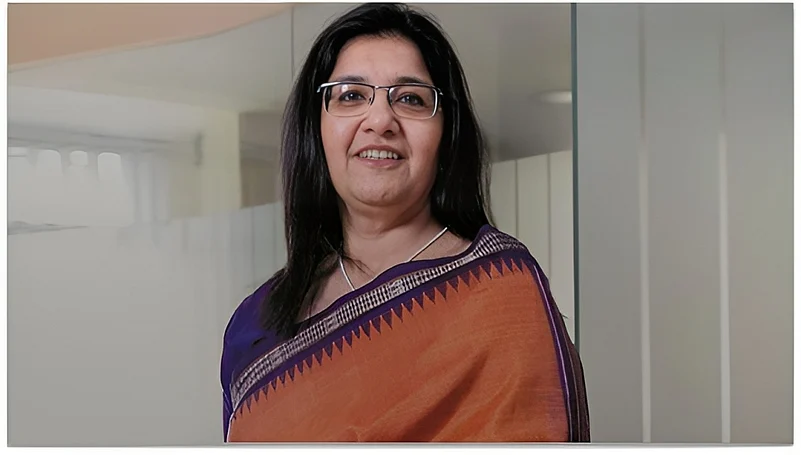As International Women's Day is set to be celebrated on March 8 this year, Outlook Business interacted with Indian Angle Network cofounder Padmaja Ruparel to discuss the challenges and opportunities for women working as entrepreneurs and investors in the start-up landscape. During the conversation, she emphasized on the need for return-to-work policies, networking support for women entrepreneurs, and gender-focused investment funds. Take a look at the complete interview below,
Balancing career and personal life is often more challenging for women. How did you navigate this, and what advice would you give to other women professionals?
In my view, each individual needs to balance professional and personal lives. The best way is to address whatever is of priority at any given time. Further, to ensure there is an equilibrium maintained, a supportive ecosystem is critical: be it at home and at work. When one enters the home, one leaves behind the “professional” and the other way round, when entering the office, leaves the “family person” behind.
A 2024 survey found that women in senior leadership roles account for 18.3% in India, a decline from 2023. In your experience, what are the key hurdles women leaders face in advancing their careers?
According to my observations, unconscious bias, the enduring belief that leadership traits are essentially masculine is one of the main obstacles that women must overcome. Growth prospects, access to key positions, and even the metrics used to measure success may be impacted by this.
Broad-based focus at the board level is critical to build gender diverse teams AND nurture women leaders. This is of course, that the “best person for the job” is underpinning the nurturing of leaders.
Secondly, building safe workplace and gender (and other parameters) equitable policies, and cultivating inclusive cultures.
Thirdly, apart from the board, women leaders themselves should carry the baton forward and mentor future generations of women leaders, ideally by showing confidence in them, sharing their own experiences, as well as mentoring men to encourage women.
Finally, women entrepreneurs are best builders for certain scaled-up ventures: because women are the largest consumers/purchasers and therefore are the best builders of start-ups This is because they not only understand what they need but have also experience with what doesn’t work and what additional functionality would solve a specific need better.
Based on recent discussions on toxic work culture that affect mental health, specifically in start-ups: Do you think they're heading in a direction that might discourage women's participation in this ecosystem?
Start-ups' fast-paced operations can occasionally result in high-pressure settings, and women are also well suited, as they have a far better ability to multi-task, bring in EQ as well, and bring a more nurturing culture. All of this is very complementary to the start-up fast moving and rapidly evolving needs by any start-up.
A 2024 study found that 75% of working mothers suffered a career setback of one to two years after taking maternity leave. How can start-ups play a role in resolving this issue?
By implementing flexible “return-to-work” programs, is a great way of bringing experience and knowledge into startups. This would require some thinking on building policies that actively promote a “return to work” culture and flexibility, and architect opportunities that leverage experience as well as provide growth. The return to work can be eased, for example, by formal re-onboarding processes, childcare support, and phase career growth.
Creating a culture that sees maternity leave as a natural part of life and not as an interruption to one's career is also important. By recognising the long-term value women bring to the organisation and ensuring leadership and advancement opportunities are present after they leave, leadership can establish the tone.
As per reports, women entrepreneurs still face unequal challenges. Have you noticed any biases in how investors perceive women-founded start-ups versus those led by men?
I think the two main challenges that women entrepreneurs face is:
- Networking: Women entrepreneurs find it far more difficult to network. To solve this, at some level, is to enable networking between women entrepreneurs themselves. This not only helps them engage actively, learning from each other's experience and build networks amongst themselves. Then as the women founders gain confidence, networking with a wider group would be easier and naturally.
- Raising Funds: While a small fraction of women founders don’t find it too difficult to raise funds, a large part of India’s women entrepreneurs (especially those not ideal for VC monies) do find it difficult to raise monies. The reason is that women, in many situations, don’t really “own” collateral or even are the “decision makers to raise debt etc.” While assets may be held in the woman’s name, the “real” owner of assets & therefore decision makers, are men – be it husband, father, son, etc. This is the social fabric of the country and women are neither real “asset owners” or for that matter “responsible for the liability”.
What advice would you give to aspiring women entrepreneurs who struggle to secure funding? Or Do you think India needs more women-focused investment funds?
I would advise you to maintain your fortitude and never give up on your goals. Although biases in the investment landscape still exist, the data indicates that women-led startups frequently outperform. It’s crucial to be well-prepared, articulate your business case with clarity, back your pitch with data, and seek out mentors who can guide you through the fundraising process. And finally, most importantly, have the confidence in yourself: SELF CONFIDENCE is the foundation of not only your business but also for your life!
At the ecosystem level, additional funds targeted at women entrepreneurs would surely help India and would create more value if additional non-financial value, like mentoring, networking, unlocking customers, helping scale, etc is embedded. Funds like IAN Alpha Fund stated focus is to invest in women entrepreneurs with at least 20-25% of their corpus.
There are very few women in angel investing and venture capital. What can be done to encourage more women to take up leadership roles in this space?
Women bring an array of opinions, compassion, and a detailed understanding of consumer markets to enable balanced investment decisions. We require a diversified approach to encourage more women to take up leadership roles in this sector. Confidence and competence building can be brought about by setting up knowledge exchange platforms, convening investor networks dedicated to women, and mentorship from experienced female investors.
To inspire others, it's also important to point out the success of women investors. Companies can help by deliberately building diverse teams, ensuring women's presence at decision-making tables, and developing environments where women's voices are valued and heard.
How much does IAN focus on funding women-led start-ups, and have you observed a shift in investor interest toward female entrepreneurs in recent years?
We at IAN are dedicated to promoting diversity in the entrepreneurial ecosystem because we acknowledge the enormous potential of women-led startups. Studies consistently demonstrate that diverse leadership produces better business outcomes, so we actively seek out and support female founders across industries, not just because it's the right thing to do, but also because it's a wise investment strategy.
Investor interest in female entrepreneurs has positively changed over time, as we have seen. More people are realising that female entrepreneurs contribute distinct viewpoints, market knowledge, and an unmatched motivation to create long-lasting companies. Even though there has been progress, more needs to be done to remove structural obstacles and guarantee that women have equal access to opportunities and capital.
Are there specific sectors where you see more women entrepreneurs emerging, and does IAN have any dedicated initiatives to support them?
We’re seeing a growing number of women entrepreneurs leading innovation across sectors like healthtech, edtech, consumer brands, and deep tech. Women founders are bringing fresh perspectives and building businesses that solve real-world problems with empathy, creativity, and resilience.
By offering not only funding but also industry connections and strategic advice, we hope to enable more women to take the lead in forming India's startup scene. The ultimate objective is to establish a setting in which an entrepreneur's access to opportunities is no longer characterized by their gender.
With India’s start-up ecosystem evolving rapidly, where do you see women entrepreneurs and investors in the next decade?
India's start-up ecosystem is growing at a never-before-seen pace, and I believe the next decade will be transformative for women investors and entrepreneurs. More women will launch successful companies and play key roles as mentors, board members, and investors as obstacles crumble and conversations about diversity, equity, and inclusion gain momentum.
Women entrepreneurs will keep pushing innovation across different sectors, especially in consumer brands, fintech, healthtech, and building scalable and impactful businesses. Meanwhile, as more women join the investment space, they will bring a nuanced understanding of markets and customer needs, shaping funding decisions that enrich a diversity of viewpoints.




























